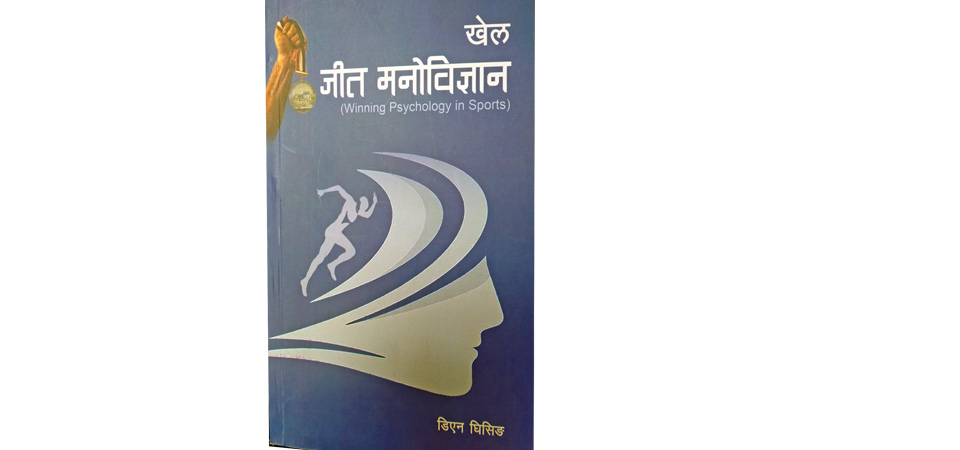Talking About‘Winning Psychology’ In Sports

Gandhi Raj Kafle
DN Ghising, the author of the under-review book, is a former karate player turned instructor. This is, in fact, a profile which shows he possesses enriched background and experiences about sports. In his book, he talks about sports exclusively from the viewpoint of winning psychology. So, the published book entitled, “Khel – Jeet Manobigyan” can be welcomed as a right publication from a right person.
To relate this book to our national context, we need to ask ourselves a key question related to sports. What is important- winning medals in competitions or keeping up winning psychology? This book deals with this issue broadly, bringing in so many subjects with an aim to nurture true concept of sportsmanship and to strengthen the competitive spirit of the nation.
Frankly speaking, Nepal’s sports history is not short if we compare it to so many other nations. Yet, the achievement is not so remarkable. Why? Even the general public in the nation seem to be anxiously supportive to sports activities. But, when the options to choose sports as future career appear, sports still gets less priority among parents and society and in this background we can imagine how difficult it would have been for youths to devote themselves professionally in sports. So, the issue of the sports as discussed by author Ghising is appropriately multidimensional and there must be broad mindset on the part of the government and society to address such issues for the convincing gains.
This 176-page book contains thirty-three pieces of writings. The author starts the issue from the very foundation of introducing the meaning of sports itself. He says sports are not limited to running and jumping only, they have also become a way of life. The inspiring quote of Great Footballer Pele, which is mentioned as footnote in the page two of the book ‘Only difficult challenge makes successes lovely’ is an evergreen words of wisdom to embrace with for the players.
In fact, there are many issues, which need to be addressed, if our nation wants to achieve successes in sports. Author DN Ghising is not demanding it only theoretically, it seems, he might have felt and experienced them formerly when he worked in different capacities in sports and here in this book he has given a shape to his ideas.
The core point as mentioned in this publication is ‘Winning Psychology’, but issues around this quality are many. Some such things the author has mentioned for achieving successes in sports are family, social and national realization on perceiving sports as a valued discipline to learn about and do best in the future.
The author is very brief and sometimes it feels it would have been better if he had shared more details from sports experiences of the nation to learn lessons for all concerned in this field. Yet, he has dragged the right issues. He discusses sports in relation with subjects like anthropology, sociology, importance of intellectual property, gender equality and psychology etc. To a society like ours where the sports sector is yet to get a proper recognition and approval of the people, this publication is important for awareness and information.
One more important feature about this book is the author has included two very important parts which provides some focuses on the freshly felt themes of challenges like the impact of the Pandemic Corona-virus for sports competition and participants. His exact titles for it are ‘The importance of winning psychology in epidemics’ and ‘The winning psychology of the athletes in the fight against Corona’.
The format the author has chosen to present his ideas about winning psychology in this sports book is brief. Each piece of writing has plenty of information and each page has footnotes to provide words of wisdom of the renowned sports personalities.
In conclusion, what we can say about this book is it is a useful publication. In competition, even veteran nation or team lose and even a novice nation or team win; results of winning or losing must be accepted gracefully. Such a dignified quality of understanding comes only through ‘winning psychology in sports’.
This book has talked lots of such issues and it is important to embrace valuable tips given in various pieces of writings by the author for improving sports image of Nepal.
Recent News

Do not make expressions casting dout on election: EC
14 Apr, 2022
CM Bhatta says may New Year 2079 BS inspire positive thinking
14 Apr, 2022
Three new cases, 44 recoveries in 24 hours
14 Apr, 2022
689 climbers of 84 teams so far acquire permits for climbing various peaks this spring season
14 Apr, 2022
How the rising cost of living crisis is impacting Nepal
14 Apr, 2022
US military confirms an interstellar meteor collided with Earth
14 Apr, 2022
Valneva Covid vaccine approved for use in UK
14 Apr, 2022
Chair Prachanda highlights need of unity among Maoist, Communist forces
14 Apr, 2022
Ranbir Kapoor and Alia Bhatt: Bollywood toasts star couple on wedding
14 Apr, 2022
President Bhandari confers decorations (Photo Feature)
14 Apr, 2022










